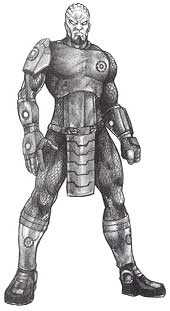| Fassai Package Deal | |
|---|---|
| Abilities | |
| Cost | Ability |
| 2 | +2 STR |
| 1 | +1 PD |
| Total Package Cost: 3 | |
Members of a proud and ancient culture, the Fassai have fallen on hard times in recent centuries. While still powerful, they lack the influence and authority they once had in the Confederation, and seek to reclaim it.

Humanoids with dark skin (usually a sort of dull brown, but in some races shading to more of a grey), the Fassai have heads with furrowed ridges and little (if any) hair. Over half the males are completely bald, and while females tend to have more hair than males, they still have very high foreheads, with the hair arranged more as a fringe around the sides of the head.
Fassai children are born after a five-month gestation period that leaves the mother virtually helpless. As a result, she must rely on the father, relatives, and/or friends to help her with basic necessities during this period. In the distant past, this led to the formation of large "family" groups that today provide the basis for the Fassai government and social structure.
Kadrigar, the Fassai homeworld, is slightly larger than Earth, with 1.2 G standard gravity. Water covers about two-thirds of the planet, leaving a full third of it for land - four large continents and a plethora of large islands. Each of the Hundred Houses controls a particular region of the planet, so traveling Fassai take care to avoid the territories of rival Houses.
Accustomed to living with others, the Fassai prefer to cluster together in cities. Fassai mega-cities, clearly visible from space, dominate the planet - but have large, mostly unsettled wilderness areas between them, criss-crossed by roads.
Millennia ago, the Fassai created a society based on oligarchic leadership systems deriving from their extended families, or "Houses." Referred to as the Hundred Houses (though there are actually slightly more than 100 of them), these institutions are enormous extended families descended from an ancestor (as often mythic as not). Within each House, the leaders of important sub-families rule as the House Council; each House Council sends a representative to the Planetary Council that governs the Fassai as a whole. Some Houses choose their leaders democratically, others by heredity, others by merit. The only constant is that each House considers its method superior to the others.
Historically, fighting between Houses occurred frequently. One House would clash with another over trading rights, farmland, or some other resource or privilege, and they'd settle the matter with arms. Over time, the Fassai have more or less grown out of this behavior, preferring to settle their intra-species differences with negotiation and other peaceful methods.
One reason the Fassai so often came to bloodshed in the past is their elaborate code of honour. To the Fassai, a House's or persons honour is paramount; insults to him or it must be avenged, and all conduct must take honour into account. Fassai honour largely boils down to this principle: a Fassai must not settle for less than he deserves. While this has some beneficial effects - it prevents a Fassai from accepting pay for a job he didn't do, and makes gambling virtually non-existent among them - it also leads to a lot of conflict when two Fassai both feel they "deserve" the same thing, or when a person feels he's getting less respect or consideration than he's due. (Most Fassai take Fassai Code Of Honour as a 15-point Psychological Limitation; it's not listed in the Package Deal because some Fassai, particularly those who've left Confederation space, scorn such "foolish" notions.)
Since their Pyrrhic victory over the Renghadi, another Confederation species, in a protracted war during the twenty-third century, the Fassai have seen their influence in Confederation society weaken. They have spent centuries trying to rebuild to their former heights of power, with only limited success, and remain ever alert for ways to increase their importance on the galactic stage.